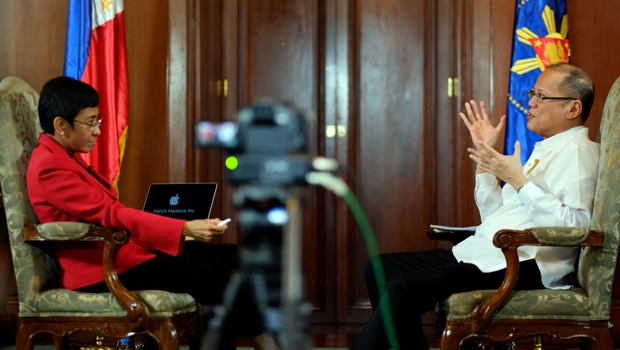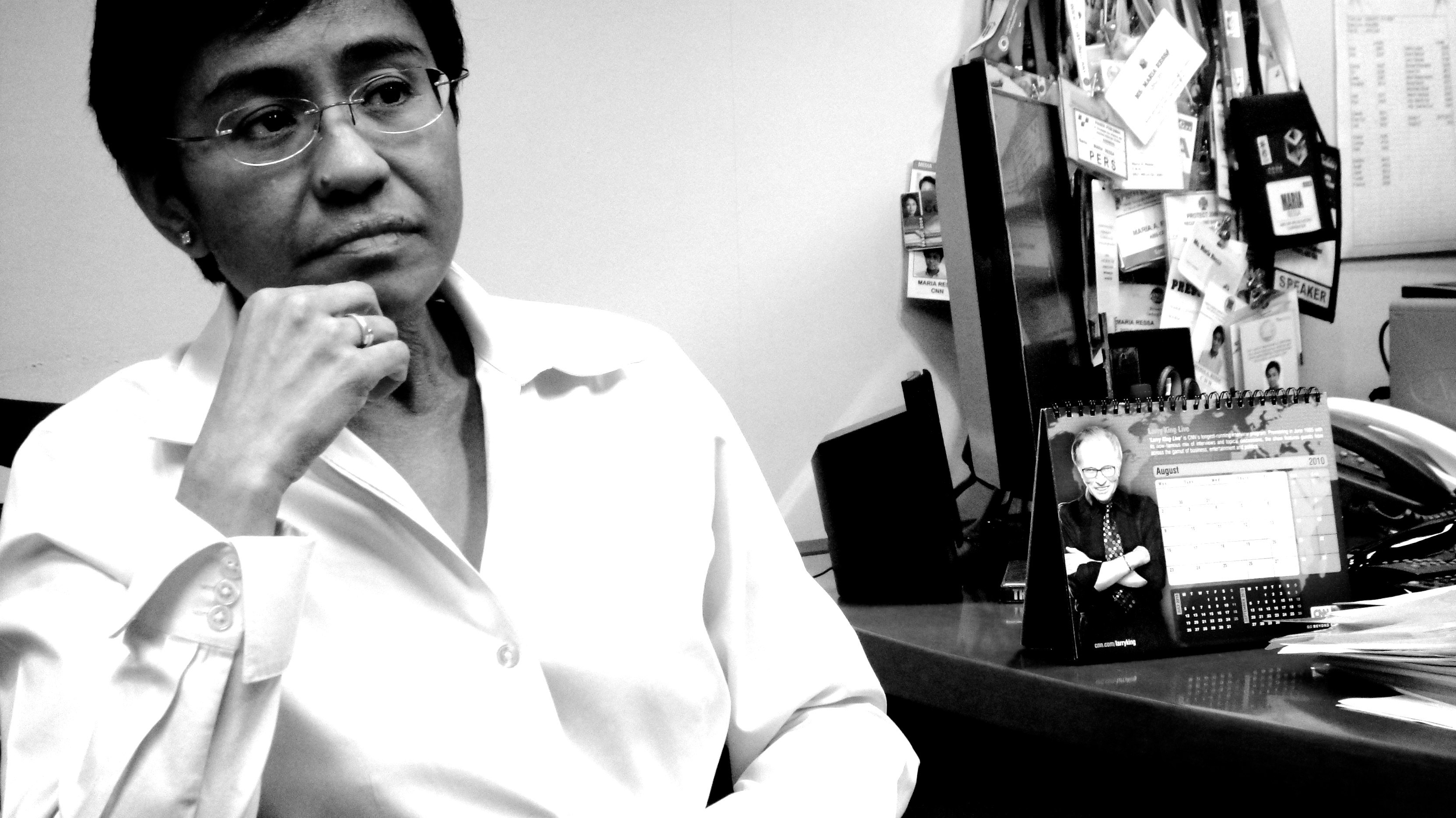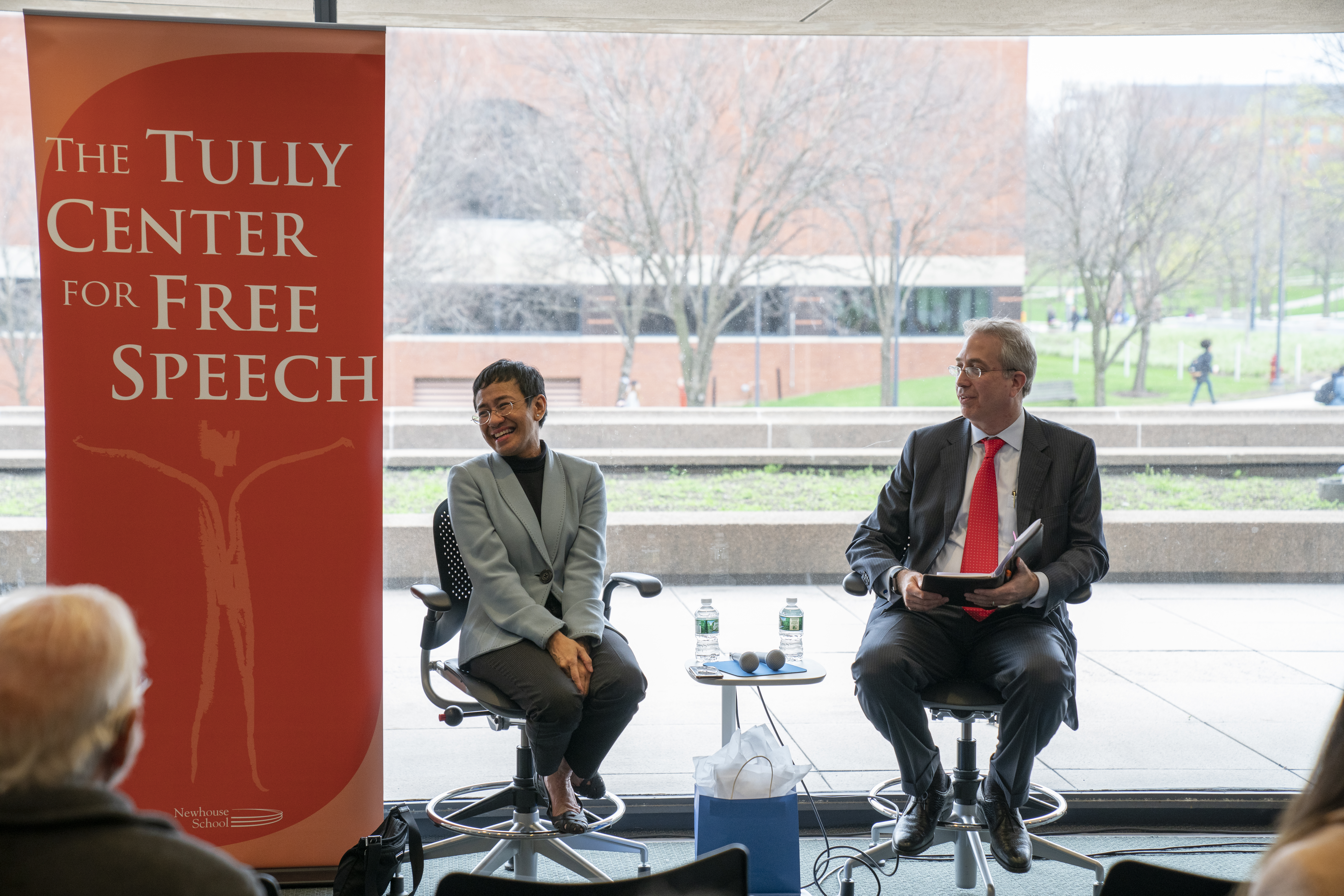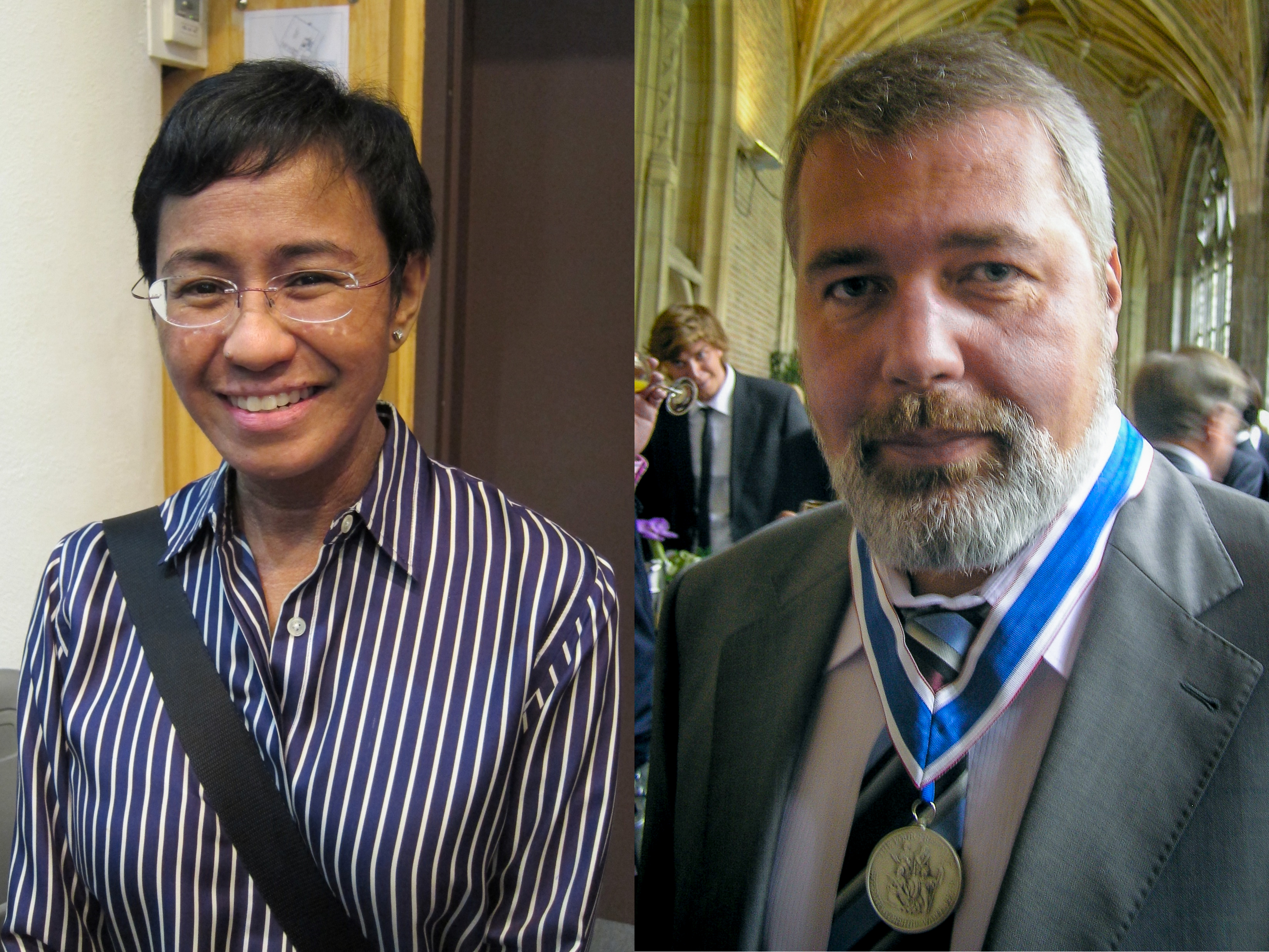1. Early Life and Education
Maria Ressa was born in Manila, Philippines, in October 1963. Her father, Phil Sunico Aycardo, who was Chinese-Filipino, died when she was one year old. She grew up speaking only Tagalog and attended St. Scholastica's College, Manila in Manila. Her mother, Hermelina, moved to the United States, leaving Maria and her sister with their paternal family, though she frequently visited her children. Later, her mother married an Italian-American man named Peter Ames Ressa and returned to the Philippines. When Maria was 10 years old, her mother brought both children to New Jersey, where Maria was adopted by her stepfather and took his surname.
Her parents settled in Toms River, New Jersey, and Ressa attended Toms River High School North, a public school. Despite barely speaking English upon her arrival in New Jersey, she excelled academically and socially, becoming a three-time president of her high school class and performing in school plays. In 2021, the school honored her by naming its newly renovated auditorium after her. Her yearbook profile reflected her ambition, stating her dreams to "set out and conquer the world."
Ressa pursued her undergraduate studies at Princeton University, where she graduated cum laude in 1986 with a Bachelor of Arts in English, along with certificates in theater and dance. Her 77-page senior thesis, titled "Sagittarius," was an allegorical play exploring Philippine politics. Following her graduation, she received a Fulbright Fellowship to study political theater at the University of the Philippines Diliman, where she also served as a faculty member, teaching several journalism courses.
2. Career
Maria Ressa's career spans decades in journalism, marked by significant roles in both traditional and digital media, and a growing involvement in academia and international initiatives focused on digital governance.
2.1. Early Career and CNN
Ressa began her professional journey at the government station PTV 4 in the Philippines. In 1987, she co-founded Probe, an independent production company, while simultaneously serving as CNN's bureau chief in Manila. She held this position until 1995, after which she moved to Jakarta to run CNN's bureau there from 1995 to 2005. As CNN's lead investigative reporter in Asia, Ressa specialized in covering and investigating terrorist networks across the region. Her expertise in this field led her to become an author-in-residence at the International Center for Political Violence and Terrorism Research (ICPVTR) of Nanyang Technological University's S. Rajaratnam School of International Studies in Singapore.
2.2. ABS-CBN and Other Media Work
From 2004 to 2010, Ressa headed the news division of ABS-CBN, one of the largest media conglomerates in the Philippines. During this period, she also continued to contribute as a writer for CNN and The Wall Street Journal. In September 2010, she authored a piece for The Wall Street Journal that critically assessed then-President Benigno Aquino III's handling of the Manila hostage crisis. This article, published just two weeks before Aquino's official visit to the United States, fueled speculation that it contributed to Ressa's decision not to renew her contract with ABS-CBN later that year.
2.3. Founding and Leading Rappler
In 2012, Maria Ressa co-established Rappler, an online news site, alongside three other female founders and a small team of 12 journalists and developers. The platform initially launched as a Facebook page called MovePH in August 2011, before evolving into a full-fledged website on January 1, 2012. Rappler quickly became one of the first multimedia news websites in the Philippines and grew into a major news portal, earning numerous local and international awards for its innovative approach to journalism. Ressa serves as both the Executive Editor and Chief Executive Officer of Rappler.
2.4. Academic and Teaching Roles
Beyond her direct involvement in news organizations, Ressa has maintained a strong presence in academia. She has taught courses on politics and the press in Southeast Asia at Princeton University and broadcast journalism at the University of the Philippines Diliman. Currently, she is a Professor of Professional Practice in the School of International and Public Affairs at Columbia University, where she leads projects related to AI and democracy. Since the fall of 2023, she has also been a Distinguished Fellow at Columbia's new Institute of Global Politics. In 2021, she was a Joan Shorenstein Fellow at the Shorenstein Center on Media, Politics and Public Policy and a Hauser Leader at the Center for Public Leadership at Harvard Kennedy School. In 2023, she joined the board of directors for The Intercept.
2.5. International Affiliations and Initiatives
Ressa has actively participated in several international bodies and initiatives aimed at addressing critical issues in the digital age. On September 25, 2020, she became a member of the 25-member Real Facebook Oversight Board, an independent watchdog group dedicated to scrutinizing Facebook's content moderation policies and its influence on civic life. In August 2022, she was appointed to the leadership panel of the United Nations' Internet Governance Forum, an annual discussion platform focused on internet-related issues. In October 2022, Ressa joined the Council for Responsible Social Media, a project launched by Issue One to tackle the adverse mental, civic, and public health impacts of social media in the United States. This council is co-chaired by former House Democratic Caucus Leader Dick Gephardt and former Massachusetts Lieutenant Governor Kerry Healey.
3. Journalism and Advocacy
Maria Ressa's career is defined by her commitment to investigative journalism and her tireless advocacy for press freedom and democratic values, often in the face of significant personal and professional risks.
3.1. Investigative Journalism
As an investigative journalist, Ressa has focused on complex and sensitive issues, particularly the rise of terrorism in Southeast Asia. Her expertise in this area is reflected in her books, Seeds of Terror: An Eyewitness Account of Al-Qaeda's Newest Center of Operations in Southeast Asia (2003) and From Bin Laden to Facebook: 10 Days of Abduction, 10 Years of Terrorism (2013).
Under her leadership, Rappler became known for its critical and in-depth reporting on political and social issues in the Philippines. Notably, Rappler extensively covered President Rodrigo Duterte's controversial war on drugs, exposing alleged abuses carried out by the police with the government's approval. The news site also investigated and reported on an alleged pro-Duterte online "troll army" that was purportedly involved in pushing out fake news stories and manipulating public narratives surrounding his presidency.

3.2. Advocacy for Press Freedom and Democracy
Ressa has emerged as a leading global voice in the defense of press freedom and the fight against disinformation. Her work with Rappler, which actively fact-checks and debunks false narratives, positioned her at the forefront of this struggle. She has consistently warned about the dangers of social media platforms being weaponized to spread propaganda and undermine democratic processes.
Her outspoken criticism of the Duterte administration and her relentless pursuit of truth through journalism have made her a symbol of resistance against authoritarian tendencies. She argues that the collective action of fact-based media is essential for restoring trust in public institutions and safeguarding democracy, a view she emphasized in October 2024, describing the 2024 United States elections as a "tipping point" for democracy, particularly concerning the role of Big Tech in siding with autocrats. Ressa's advocacy extends beyond reporting, actively promoting democratic principles and human rights in challenging political environments.
4. Legal Battles and Controversies
Maria Ressa and Rappler have faced numerous significant legal challenges and controversies, particularly during the administration of President Rodrigo Duterte, which have been widely seen as politically motivated attempts to silence critical journalism.
4.1. Criticism of the Duterte Administration
Rappler, under Ressa's leadership, maintained a consistently critical stance against President Rodrigo Duterte's policies, especially his administration's war on drugs. Rappler's investigative reports highlighted alleged abuses by the police and suggested that these actions were carried out with Duterte's approval. The news site also published articles detailing an alleged pro-Duterte online "troll army" that was accused of disseminating fake news and manipulating public discourse to support the presidency.
In response, President Duterte publicly declared in July 2017 that Rappler was "fully owned" by Americans, asserting it was in violation of the Philippine constitution. He further stated, "Not only is Rappler's news fake, it being Filipino is also fake." Following these remarks, the Philippine Securities and Exchange Commission (SEC) initiated an investigation into Rappler in August 2017 and subsequently revoked its license to operate in January 2018. Although the case was remanded back to the SEC by the court of appeals for lacking basis, the government continued its pressure. In 2018, Duterte told a Rappler reporter, "If you are trying to throw garbage at us, then the least that we can do is explain - how about you? Are you also clean?"
4.2. Cyberlibel Case
On January 22, 2018, Ressa was subpoenaed by the National Bureau of Investigation (NBI) in connection with an online libel complaint filed under the Cybercrime Prevention Act of 2012. The complaint, filed in October 2017 by businessman Wilfredo Keng, stemmed from a Rappler article published in 2012 that alleged Keng had lent his sports utility vehicle to then-Chief Justice Renato Corona as a bribe. Despite the article being published before the Cybercrime Prevention Act was enacted, the Department of Justice argued that a typographical error correction in 2014 constituted "republication," making it subject to the new law.
On February 13, 2019, Judge Rainelda Estacio-Montesa of the Manila Regional Trial Court Branch #46 issued an arrest warrant for Ressa on cyberlibel charges. Her arrest by NBI officials was live-streamed by Rappler reporters, drawing widespread attention. Due to time constraints, Ressa was initially unable to post bail of 60.00 K PHP (approximately 1.15 K USD), leading to her confinement within the NBI building. She was released on bail of 100.00 K PHP (approximately 1.90 K USD) the following day.

Ressa's arrest and subsequent conviction were met with strong international condemnation, with many viewing them as politically motivated actions by the Duterte government aimed at stifling dissent. Former U.S. Secretary of State Madeleine Albright stated that the arrest "must be condemned by all democratic nations." The National Union of Journalists of the Philippines called it "a shameless act of persecution by a bully government." Organizations such as Human Rights Watch, Amnesty International, and Reporters Without Borders (which described the proceedings as "Kafkaesque") also criticized the ruling. Conversely, the official spokesperson for the Malacañang Palace denied government involvement, asserting it was a private lawsuit, while the National Press Club, an organization accused of ties to the Duterte regime, argued the arrest was not harassment and warned against politicizing the issue.
In July 2019, Ressa's trial for cyberlibel began. She stated on the first day, "This case of cyberlibel stretches the rule of law until it breaks." On June 15, 2020, Judge Rainelda Estacio-Montesa found Ressa guilty, stating that Rappler "did not offer a scintilla of proof that they verified the imputations of various crimes in the disputed article... They just simply published them as news in their online publication in reckless disregard of whether they are false or not." Ressa faces a potential prison sentence of between six months and six years, along with a fine of 400.00 K PHP (approximately 8.00 K USD). She warned that her conviction could signal the end of freedom of the press in the Philippines. Vice President Leni Robredo described the conviction as a "chilling development."
In January 2023, 12 Nobel Peace Prize laureates, including all of the 2022 laureates and her fellow 2021 Nobel Peace Prize winner Dmitry Muratov, issued an open letter to President Bongbong Marcos requesting his assistance in resolving the "unjust charges against Maria Ressa and Rappler." Ressa's legal team included human rights lawyers Amal Clooney, Caoilfhionn Gallagher, and Can Yeğinsu, alongside the Free Legal Assistance Group (FLAG) in the Philippines, led by Atty. Theodore Te. In March 2024, the Supreme Court of the Philippines allowed Irene Khan, a United Nations expert, to intervene as an "amicus curiae" (friend of the court) in Ressa's cyberlibel case, citing concerns that the Cybercrime Prevention Act limits journalists' ability to report on public interest issues. The International Bar Association's Human Rights Institute was also permitted to submit its legal opinion.
4.3. Tax Evasion Charges and Acquittals
In November 2018, the Philippine government announced that it would charge Ressa and Rappler's parent company, Rappler Holdings Corporation, with tax evasion and failure to file tax returns. These charges were related to an investment in Rappler by the Omidyar Network in 2015. Ressa denied any wrongdoing, initially stating the foreign money was "donated" and later clarifying that the investments were in the form of securities. The Philippines' Bureau of Internal Revenue, however, concluded that Rappler's issuance of securities-generated capital gains was taxable and that the company had evaded payment amounting to 133.00 M PHP in taxes.
Despite these accusations, Ressa and Rappler have achieved significant legal victories in their tax-related cases. In January 2023, the Philippine Court of Tax Appeals acquitted Ressa and Rappler of four tax evasion charges stemming from the 2018 case. A fifth tax evasion case against Ressa also resulted in an acquittal in September 2023. This acquittal was upheld by the Court of Tax Appeals Second Division in July 2024. As of September 2023, Ressa's court conviction for cyberlibel and the SEC's order for Rappler to shut down remain under appeal.
5. Awards and Recognition
Maria Ressa has received numerous prestigious awards and honors throughout her career, recognizing her contributions to journalism, media innovation, and her courageous defense of press freedom and human rights.
5.1. Journalism and Press Freedom Awards
Ressa's work as a journalist has been widely acknowledged. She has received an Emmy nomination for Outstanding Investigative Journalism and multiple Asian Television Awards. In the Philippines, she was recognized with the TOWNS - Ten Outstanding Women in the Nation's Service and the TOYM Philippines.

Notable awards specifically recognizing her commitment to press freedom and investigative reporting include:
- In November 2017, as CEO of Rappler, she accepted the 2017 Democracy Award from the National Democratic Institute, given to organizations fighting disinformation.
- In May 2018, she received the Knight International Journalism Award, lauded as "an intrepid editor and media innovator who holds a spotlight to the Philippine government's bloody war on drugs."
- In June 2018, the World Association of Newspapers awarded her the Golden Pen of Freedom Award for her work with Rappler.
- In November 2018, the Committee to Protect Journalists presented her with the Gwen Ifill Press Freedom Award for her "journalistic courage in the face of persistent official harassment."
- In February 2019, she received the Ka Pepe Diokno Human Rights Award, alongside Bishop Pablo Virgilio "Ambo" David, from the Tañada-Diokno College of Law at De La Salle University and the Jose W. Diokno Foundation.
- In May 2019, she was honored with the Columbia Journalism Award, the school's highest honor, for the "depth and quality of her work, as well as her courage and persistence in the field."
- In June 2019, the Canadian Journalism Foundation presented her with its Tribute honor, recognizing her impact on the international stage.
- In April 2021, Ressa was awarded the UNESCO/Guillermo Cano World Press Freedom Prize.
5.2. Time Person of the Year
In December 2018, Maria Ressa was included in Time magazine's Time Person of the Year 2018 issue. She was featured as one of "The Guardians," a collective of journalists from around the world recognized for their active combat against the "War on Truth." Ressa is the second Filipino to receive this title, following former President Corazon Aquino in 1986. In April 2019, she was also listed among Time magazine's 100 Most Influential People in the World.
5.3. Nobel Peace Prize

Maria Ressa was nominated for the 2021 Nobel Peace Prize by Jonas Gahr Støre, then prime minister and leader of the Norwegian Labour Party. On October 8, 2021, it was officially announced that Ressa would share the prize with Dmitry Muratov of the Russian Federation. They were jointly awarded the prize "for their efforts to safeguard freedom of expression, which is a precondition for democracy and lasting peace." Ressa and Muratov are the first journalists to receive the Nobel Peace Prize since 1935.
5.4. Other Significant Honors
Ressa has also received various other accolades:
- In 2010, Esquire magazine proclaimed Ressa the Philippines' "sexiest woman alive," citing her fearlessness in reporting on Al-Qaeda.
- In 2015, the Philippine Movie Press Club honored Ressa with an Excellence in Broadcasting Lifetime Achievement award at the 29th PMPC Star Awards for Television.
- In 2016, she was listed among the eight most influential and powerful leaders in the Philippines by Kalibrr.
- In February 2022, Ressa received Princeton University's highest undergraduate alumni honor, the Woodrow Wilson Award.
- In November 2022, she was granted an honorary degree from MacEwan University in Edmonton, Canada.
- In June 2023, Ressa received an honorary degree in sociology from the Ateneo de Manila University after delivering the commencement speech.
- In 2024, Ressa was named Harvard University's commencement speaker. Her selection drew her into the controversy of on-campus protests about the Gaza war. In her speech, she remarked, "I was attacked online and called antisemitic, by power and money. Because they want power and money. While the other side was already attacking me because I had been onstage with Hillary Clinton. Hard to win, right?" During her speech, Rabbi Hirschy Zarchi of Harvard walked off the stage.
- Also in 2024, Ressa was named the Cannes LionHeart recipient, an honor announced by Simon Cook, CEO of Cannes Lions. She was scheduled to deliver a keynote address at the Debussy Stage on June 21, 2024.
6. Published Works
Maria Ressa is the author of several notable books, primarily focusing on the complex issues of terrorism and the challenges to democracy in the digital age.
- Seeds of Terror: An Eyewitness Account of Al-Qaeda's Newest Center of Operations in Southeast Asia (Free Press, 2003)
- From Bin Laden to Facebook: 10 Days of Abduction, 10 Years of Terrorism (World Scientific, 2013)
- How to Stand Up To a Dictator: The Fight for Our Future (HarperCollins, 2022)
7. Personal Life
Maria Ressa is openly lesbian. In May 2024, Congresswoman Elise Stefanik accused Ressa of antisemitism concerning a Rappler editorial that drew comparisons between Israel and Nazi Germany. An earlier comment Ressa made about "money and power" during her Harvard commencement speech was also criticized by a Harvard Rabbi.
8. Legacy and Impact
Maria Ressa's legacy is profoundly shaped by her relentless pursuit of factual reporting and her courageous stand against disinformation and authoritarianism. As the co-founder and CEO of Rappler, she pioneered a new model of digital journalism in the Philippines, earning numerous accolades for its innovative approach and critical coverage. Her investigative work, particularly on the Philippine drug war and the spread of state-sponsored disinformation, brought global attention to the erosion of democratic norms and press freedom in the country.
Ressa's legal battles, including the controversial cyberlibel conviction and multiple tax evasion charges, have become emblematic of the challenges faced by journalists worldwide who dare to hold power accountable. These cases have sparked international condemnation and galvanized support for press freedom advocates. Her receipt of the Nobel Peace Prize in 2021 cemented her status as a global icon in the fight for freedom of expression, underscoring the critical role of independent journalism in safeguarding democracy and fostering lasting peace. Her continued advocacy highlights the ongoing struggle against digital authoritarianism and the importance of fact-based media in restoring public trust.